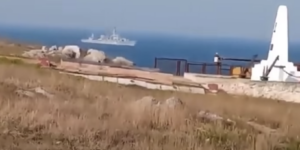
Screenshot from video said to be shot by Snake Island guards, on social media
The bravery and devotion to duty of the small State Border Guard Service garrison on Snake [Zmiinyi] Island, an outpost of Ukrainian territorial boundaries in the Black Sea, has been much on social media. When a Russian naval vessel, said to be the cruiser Moskva, demanded their surrender in the first day of the Russian invasion, the troops quickly discussed what to do then replied, “Russian warship, go fuck yourself.”
(Some news outlets asterisk-out the word, or report it as “go to hell,” but I think if the garrison had the courage to say it, in the face of overwhelming force and at the cost of their lives, it should be read verbatim.)
The Washington Post reported that President Zelensky said the garrison had “attempted to protect the island for much of Thursday before they [all 13] were killed.” Zelensky said each of the guards would be posthumously awarded the title “Hero of Ukraine,” the highest honor he could bestow. The head of the SBGS, an “independent law enforcement agency,” reports directly to Ukraine’s President; their maritime unit is said to be similar to the US Coast Guard.
The Ukrainian reply recalls US Brigadier General Anthony McAuliffe’s reply to the Nazis laying siege to Bastogne, Belgium, in December 1944. To their demand for American surrender, McAuliffe, the commander of the 101st Airborne Division, replied, “NUTS.” The impulse, I think, never having had to make such a choice myself, is a way of reverting to the human realm, after expecting to have chosen the biggest military sacrifice.
McAuliffe’s reply is often compared to French General Pierre Cambronne’s apocryphal response to the demand for surrender at Waterloo: Merde. While colorful, that was perhaps an invention of Victor Hugo. Cambronne denied saying it, or the other version reported, “La garde meurt et ne se rend pas!” (“The guard dies and does not surrender.”)
Nothing is easy among cultures, language, history, and conflict. “Merde” is evidently not as straightforward as one might think. A Russian-speaking friend tells me the SBGS response translates literally as, “Go to the dick,” but that its strongest meaning as we know it is clear.
This morning, new tweets claimed to show video of the Ukrainian garrison safely debarking in Sevastopol, as prisoners of the Russians, but the video was not confirmed. The posts of it that I saw all led back to a pro-Russian account with supporting comments from other accounts, which sounded more like propaganda deployed in the past by Russian military intelligence, the GRU.
Ukraine has been winning the war of public opinion on social media, itself made possible by fierce Ukrainian resistance that slowed the Russian advance on its cities. Several heroes have risen in the popular imagination and are no doubt terrific for morale.
There is the Ghost of Kyiv, said to be a single Ukrainian fighter pilot with six kills. (As of today, the Russians have not achieved air superiority, which may be keeping those lines of helicopters, seen by satellite in a field in Belarus, on the ground and out of Kyiv.) As US historian Heather Cox Richardson says, this ghost pilot “who may or may not be real, and who may or may not be a woman…has shot down six Russian planes. Such a superhuman legend symbolizes Ukraine’s people this terrible week.” (One video of this purported fighter jet has been debunked, and there has been no confirmation of one pilot downing so many Russian aircraft.)
There is Vitali Klitschko, mayor of Kyiv, a square-headed PhD once known as “Dr. Ironfist,” a heavyweight boxing champ, who has taken up arms along with his brother, Wladimir, also a heavyweight champ, and Ukrainian MPs such as Kira Rudik, who said she was planning to plant flowers in her back garden until all this happened.
There is President Zelensky himself, appearing at press conferences and on social media to debunk disinformation and rally his people to fight. This morning a tweet showed a gif of him in a ballistic vest, having morning coffee with other armed defenders, and a caption that read, “Imagine what a moral boost it must be for these troops to have the freakin’ president literally fighting next to you. What a badass.”
Then there is the savage Ukrainian granny who told Russian troops to put sunflower seeds in their pockets, so that when they died the flowers would grow.
Only time will tell the real story of actions taken by individuals in a sweeping historical conflict that many say has the potential to be the start of WWIII. What is certainly true now is that our time is filled with bullies working against civilization and announcing what they are going to do or take. They always shout that if we resist their behaviors it proves we lied about tolerance. But power, including that of a society run by rule of law, is based ultimately on its ability to stand up to forces challenging its right to exist at all. This is hard to do, inconvenient, and very costly. It is wonderful to see genuine heroism in this vein.
